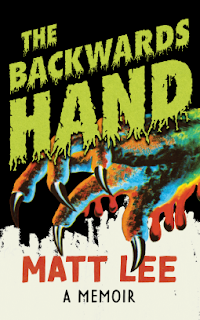I have to confess, though, that she's kind of a low-dose author for me. I enjoyed the hell out of her debut novel, Bad Marie, many years ago, but it left me feeling just icky enough not to want especially to indulge in that very specific kind of pleasure again for a long time. Which is to say that I haven't read any of Dermansky's work since Bad Marie. And her newest, Hot Air, hasn't changed my view of her work one bit -- even though I really liked it.
Dermansky's subject is, at bottom, class envy, and it's a subject about which she is wickedly funny. The titular character of her first novel is a delightfully trashy person with whom to spend a few hours, watching her unhinged schemes go awry as she goes on a one-woman/one-child crime spree. Well, more of a misdeeds spree, although she happens to commit a few petty and one decidedly un-petty in the process. She has been badly used by her upscale friend who made the mistake of hiring her as a nanny, and feels perfectly justified, she tells us over hundreds of pages, in committing whatever malefaction she likes against that friend. We are happy to be persuaded, over and over again, even if she never really convinces us.
For Hot Air Dermansky has expanded the perspective she gives us to that of several characters, though pretty tightly focused on her signature distressed bourgeois heroine, Joannie. Joannie is somewhat recently divorced and rents an unsatisfactory-to-her apartment* in a neighborhood dominated by what sounds like a lot of McMansions. She has a daughter, Lucie, a tween who is well on her way toward becoming even less tolerable than her mommy is and for whom Joannie is about to set a whole lot of bad examples in one disastrous weekend-and-change.
Joannie lives next door to Johnny, a decent looking divorced guy with a son, Tyson, who is Lucie's approximate age. Johnny owns a very nice house with a very nice swimming pool, more or less next door to Joannie's apartment complex. Johnny is so nicely set up that he even gets along well enough with his ex-wife to have her living in the very nice house across the street from him, so he even has an easy time sharing custody of Tyson. Are you humming the Brady Bunch theme right now? I was. And so are Joannie and Johnny, as we quickly learn when the novel opens with Joannie on a pseudo-date with Johnny. To save on childcare expenses, Joannie has manipulated Johnny into having the date over at his house, with Tyson and Lucie banished to the basement with their various screen-equipped devices. So far, so good.
Except, as Joannie informs us pretty much right away, she is not feeling like their boy-girl Lego is ever going to click (I love that phrase, which I stole from William Gibson, because of course I did), and while it's mostly because their names will sound dumb together, Joannie and Johnny, it's also because she's just not feeling it with him, especially after he rather inexpertly kisses her. And kisses her. Oh noes! She forgot to make arrangements with someone to send a fake emergency text to get her out of this!
Fortunately, the plot happens. In the form of a hot air balloon that a rich, brash techbro type rented to celebrate his wedding anniversary after only having had a few lessons. As in not enough lessons to responsibly be allowed to pilot a balloon unsupervised, but when has that ever stopped a rich and famous and handsome billionaire?
As you already would know from a glance at the jacket copy, the billionaire's balloon comes crashing into Johnny's swimming pool and hijinks and sexcapades and a whole bunch of other bad decisions ensue. We're barely acquainted well enough to dislike Joannie and Johnny and here's Marcy Dermansky, serving us up an even more annoyingly privileged couple to dislike even more. One can never accuse Dermansky of being stingy with us; Jonathan (yes, there is a Johnny and a Jonathan in this awkward little bottle-book) and Julia have fallen out of love with each other, believe the world has done them dirty despite being billionaires, feel entitled to absolutely everything including Jonathan's personal assistant, Vivian (whom Julia wants to adopt as their own Vietnamese orphan despite Vivian being an adult with perfectly good parents of her own, and Jonathan just wants to bone, basically) and, once they get a load of Joannie and Lucie, to Lucie. They stop short of offering to buy Lucie, but only just.
BUT, lest we start feeling much in the way of sympathy or empathy for Joannie, who has barely gotten over her sick envy of Johnny's swimming pool and ridiculously over-equipped kitchen before being given people to really envy (and it turns out Jonathan just happens to have been Joannie's first kiss, at a summer camp when they were kids, who then ghosted her the day after Joannie's first kiss), she kind of seems like she'd maybe be down for selling Lucie, or at least renting her out for a little while? In exchange for a chance to share, just a little bit, in Johnny and Julia's fabulous lifestyle? But no, that would probably be too icky.
We have only this slight and kind of token assurance that Joannie has a firm line on what is and is not too icky, by the way. Because there are so many other icky things that she doesn't really even need to be pushed into doing. So many. So icky. But at least she is somewhat redeemed, as Bad Marie was in her novel, by her deep and true love for her little girl. Even though the little girl is a whiny brat.**
And all we can do is point and laugh and wait for consequences. Which, since this is fiction and not the actual world, do happen somewhat, at some points. See why I'm saying Dermansky's big moment may only just now be arriving? Despite what looks like has been a pretty decent literary career?
Just, you know, life sure do like to imitate art, don't it?
Anyway, I'll read some more of her back catalog someday, probably. If nothing else, it might soon be my only safe outlet.
*That, I dunno, sounds pretty nice to me, but I guess I must grudgingly admit that after living a nice, somewhat prosperous married life in a nice house, it's the kind of come-down that would sting some. Still, if we want to talk about class envy, this woman is living in a nice and safe area with good access to schools and shopping and is able to support herself and her daughter in pretty decent style off a literary career. Um. Where's my micro-violin?
**Really, the only character with even a pretense of likeability is Johnny's son, Tyson, but he doesn't get a lot of ink and would probably show obnoxious true colors if he got much more. Dermansky isn't about winning you over with loveable characters, you guys.


















